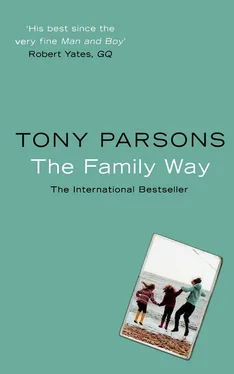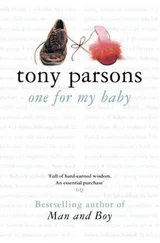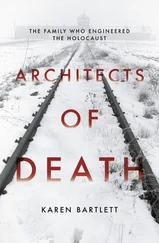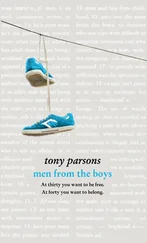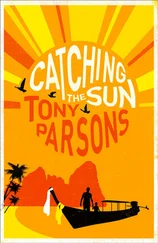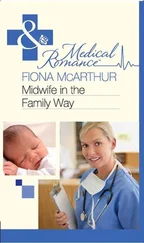The Family Way
Tony Parsons

For Jasmine
Cover Page
Title Page The Family Way Tony Parsons
Dedication For Jasmine
Part one: the world is her biscuit Part one: the world is her biscuit
One
Two
Three
Four
Five
Six
Seven
Eight
Nine
Ten
Part two: a family of two
Eleven
Twelve
Thirteen
Fourteen
Fifteen
Sixteen
Seventeen
Eighteen
Part three: the most natural thing in the world
Nineteen
Twenty
Twenty-one
Twenty-two
Part four: born at the right time
Twenty-three
Twenty-four
Twenty-five
Twenty-six
Twenty-seven
Twenty-eight
Inside:
Knocked Up With Julia Roberts: Q & A with Tony Parsons
Exclusive extract from My Favourite Wife—out now in paperback
THE FAMILY WAY
Praise
By the Same Author
Copyright
About the Publisher
Part one: the world is her biscuit
‘Your parents ruin the first half of your life,’ Cat’s mother told her when she was eleven years old, ‘and your children ruin the second half.’
It was said with the smallest of smiles, like one of those jokes that are not really a joke at all.
Cat was an exceptionally bright child, and she wanted to examine this proposition. How exactly had she ruined her mother’s life? But there was no time. Her mother was in a hurry to get out of there. The black cab was waiting.
One of Cat’s sisters was crying – maybe even both of them. But that wasn’t the concern of Cat’s mother. Because inside the waiting cab there was a man who loved her, and who no doubt made her feel good about herself, and who surely made her feel as though there was an un-ruined life out there for her somewhere, probably beyond the door of his rented flat in St John’s Wood.
The childish sobbing increased in volume as Cat’s mother picked up her suitcases and bags and headed for the door. Yes, thinking back on it, Cat was certain that both of her sisters were howling, although Cat herself was dry-eyed, and quite frozen with shock.
When the door slammed behind their mother and only the trace of her perfume remained – Chanel No. 5, for their mother was a woman of predictable tastes, in scent as well as men – Cat was suddenly aware that she was the oldest person in the house.
Eleven years old and she was in charge.
She stared at the everyday chaos her mother was escaping. Toys, food and clothes were strewn across the living room. The baby, Megan, a fat-faced little Buddha, three years old and not really a baby at all any more, was sitting in the middle of the room, crying because she had chewed her fingers while chomping on a biscuit. Where was the nanny? Megan wasn’t allowed biscuits before meals.
Jessica, a pale, wistful seven-year-old, who Cat strongly suspected of being their father’s favourite, was curled up on the sofa, sucking her thumb and bawling because – well, why? Because that’s what cry-baby Jessica always did. Because baby Megan had hurled Jessica’s Air Stewardess Barbie across the room, and broken her little drinks trolley. And perhaps most of all because their mother found it so easy to go.
Cat picked up Megan and clambered onto the sofa where Jessica was sucking her thumb, for all the world, Cat thought, as if she was the baby of the house. Cat hefted her youngest sister onto her hip and said, ‘Come on, dopey,’ to the other one. They were just in time.
The three sisters pressed their faces against the bay window of their newly broken home just as the black cab pulled away. Cat remembered the profile of the man in silhouette – a rather ordinary-looking man, hardly worth all this fuss – and her mother turning around for one last look.
She was very beautiful.
And she was gone.
After their mother had left, Cat’s childhood quietly expired. For the rest of that day, and for the rest of her life.
Their father did all he could – ‘the best dad in the world’, Cat, Jessica and Megan wrote annually on his Father’s Day cards, their young hearts full of feeling – and many of their childminders were a lot kinder than they needed to be. Years after they had gone home, Christmas cards came from the ex-au pair in Helsinki, and the former nanny in Manila. But in the end even the most cherished childminders went back to their real life, and the best dad in the world seemed to spend a lot of his time working, and the rest of the time trying to work out exactly what had hit him. Beyond his restrained, unfailingly well-mannered exterior, and beyond all the kindness and charm – ‘He’s just like David Niven,’ awe-struck strangers would say to the girls as they were growing up – Cat sensed turmoil and panic and a sadness without end. Nobody ever sets out to be a single parent, and although Cat, Jessica and Megan never doubted that their father loved them – in that quiet, smiley, undemonstrative way he had – he seemed more unprepared than most.
As the oldest, Cat learned to fill in the gaps left by the parade of nannies and au pairs. She cooked and childminded, did some perfunctory cleaning, and a lot of clearing up (many of their kiddie-carers refused to do anything remotely domestic, as if it were against union rules). Cat learned how to program a washing machine, knew how to disable a burglar alarm and, after a few months of frozen meals and fast food, taught herself to cook. But there was one thing she learned above all others: before she was in her teens, Cat Jewell had some idea of how alone you can feel in this world.
So the three sisters grew.
Megan – pretty and round, voluptuous, her sisters called her, but the only one of them who would always have to watch her weight, academically brilliant – who would have thought it? – with all the fierceness of the youngest child.
Jessica – the doe-eyed dreamer, the sensitive one, prone to laughter and tears, who turned out to be the unexpected boy magnet of the three, looking for that one big love behind the bicycle sheds and in the bus shelters of their suburban neighbourhood, quietly nursing a desire for a happy home.
And Cat – who quickly grew as tall as their father, but who never outgrew the small-breasted, long-limbed dancer’s body she had as a girl, and never outgrew the unspeakable rage of being abandoned, although she learned to disguise her scars with the bossy authority of the eldest child.
They clung to each other and to a father who was rarely around, missing their mother, even when things were bad and they hated her, and after a while the fact that Cat had forsaken her childhood seemed like the least of their worries.
Cat loved her father and her sisters, even when they were driving her nuts, but when the time came, she escaped to Manchester and university with a happy sigh – ‘As soon as someone left the door slightly ajar,’ she liked to tell her new friends. And while Jessica married her first serious boyfriend and Megan moved in with her first real boyfriend, Cat lost herself in her studies and later her work, in no rush to build a home and start a family and return to the tyranny of domesticity.
She knew all about it. Family life meant nothing in the fridge, a mother gone, Jessica crying and baby Megan squawking for ‘bis-quits, bis-quits’.
Family life was their father away working, the au pair shagging some new boy out in the potting shed and not a bloody bis-quit in the house.
Читать дальше
